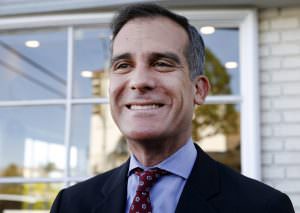Joe Conason: Fire Chertoff, for Starters
Department of Homeland Security chief Michael Chertoff may have again revealed his incompetence by slashing New York's anti-terror funding, but the problems plaguing that agency reach far deeper than one man.Michael Chertoff possesses the impressive resume and aggressive bearing of a big-time official, but as secretary of homeland security he behaves more like a small-time hack. His feeble judgment in matters of policy, personnel and politics — first demonstrated in the wake of Hurricane Katrina last year — has proved that he was never qualified to protect the United States from terrorism and natural disaster.
Last week, he reminded the nation of his manifest incompetence after his department released a bizarrely skewed list of security grants to cities and counties. Municipalities that confront the most significant threats will lose many millions in funding, while those least likely to face attack will receive additional millions.
Even more outrageous than the funding decisions were the explanations offered by departmental staffers and Chertoff, who had promised to award money on the basis of actual need instead of political clout. To justify cutting New York City’s grant by nearly half, the department claimed that city officials had failed to fill out the grant application properly. It also asserted that the nation’s greatest city has no significant landmarks, and that the superb counter-terrorism division of the New York City Police Department is somehow substandard.
While the firing of Chertoff certainly would be overdue, as the tabloid headlines suggest, his dismissal would not solve the department’s problems. The priorities at DHS have been badly distorted from the beginning, with partisan patronage and lobbyist influence taking precedence over efficiency and effectiveness. The controversial grants issued to municipalities are dwarfed by contracts awarded to private corporations, contracts that amount to about $10 billion annually.
To observe the unsavory workings of that process is to wonder whether New York, Washington and other big cities lost funding simply because they failed to hire the most-connected lobbyists. The big defense, electronics and communications firms at the DHS trough, along with their friends from K Street and the members of Congress whose campaigns they finance, never suffer the same difficulties as the struggling cities.
Whether the tens of billions awarded by DHS have been well spent is in grave doubt. Shipping ports, nuclear facilities and chemical plants remain poorly protected. First responders in many cities still don’t have the communications and protective equipment they need. Public health agencies are too weak and neglected to cope with the threat of an avian flu pandemic.
The wiring of DHS for lobbyists — and the dominant influence of political appointees — became inevitable when President Bush appointed former Pennsylvania Gov. Tom Ridge, amiable and malleable, to direct the White House Office of Homeland Security. He staffed the office with political aides and ex-lobbyists whose resumes were long on politics and short on security. When DHS was established in 2003, the revolving door between its offices and Blank Rome — a lobbying firm that enjoyed an intimate relationship with Ridge and his associates — spun incessantly.
Blank Rome’s chairman was a “Bush Ranger,” of course, while two other partners were “Bush Pioneers.” One of those partners took a year off from the firm to help set up the mammoth new department. As a result, Blank Rome has led the K Street pack in DHS clients and billing.
This greasy political culture seems depressingly familiar, except that the stakes at DHS are so much higher than at other federal agencies where private boodling outweighs the public interest. Both firms that employed the convicted crook Jack Abramoff have represented major DHS contractors, as have all of the largest lobbying outfits in the capital. There are fees aplenty — and hundreds of millions of dollars to squander on wasteful programs and boondoggles.
Unfortunately, little has changed for the better since Chertoff took over for Ridge. He brought along his own group of associates and cronies, notoriously including Julie Myers, the chief of staff’s wife, whose lack of relevant administrative experience didn’t deter him from appointing her to direct immigration and customs enforcement. (She also happens to be the niece of Gen. Richard B. Myers, the former Joint Chiefs chairman.) Tracy Henke, the official who oversaw those weird municipal grants, is a political appointee who seems to be in far over her head.
The last time that the public demanded accountability at DHS, following the deadly fiasco on the Gulf Coast, Chertoff escaped by sacrificing hapless FEMA chief Michael (Brownie) Brown. This time, the DHS chief himself may have to go — but nobody should expect serious reform, or real security, under this regime.
Your support matters…Independent journalism is under threat and overshadowed by heavily funded mainstream media.
You can help level the playing field. Become a member.
Your tax-deductible contribution keeps us digging beneath the headlines to give you thought-provoking, investigative reporting and analysis that unearths what's really happening- without compromise.
Give today to support our courageous, independent journalists.






You need to be a supporter to comment.
There are currently no responses to this article.
Be the first to respond.